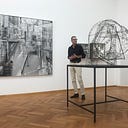Thinking out loud about past, present and future (#2) — Thoughts on growth, mastery and playfulness beyond the pool table

“The most fruitful and natural exercise for our minds is, in my opinion, conversation.” — Michel de Montaigne, Of The Art Of Conference
As we, Eitan Reich and Mark Storm, are planning for a transformative learning program to help senior managers and executive leaders make sense of the world, we often share our thoughts and ideas, and talk about our own experiences. Our conversations meander in many directions and frequently run into dead-end streets. We like to share them anyway because we believe that ‘thinking out loud’ is not only “the most fruitful and natural exercise for our minds” but also leads to the most beautiful results, in the end…
This time, we talk about growth, winning and competition (0:00–0:42), mastery and how art exposes principles (3:05–5:38), conversations and things not being ‘either/or’ (5:39–6:17), and playfulness beyond the pool table (6:49 onwards).
On growth, mastery and playfulness beyond the pool table
Most leadership teams take a one-dimensional, linear perspective on growth and the question ‘What does growth mean?’ is seldom raised. After all, why ask such a question when the answer is obvious — when we simply assume it is ‘more’ and ‘bigger’?
But growing ‘bigger’ isn’t the answer. Just like the social philosopher Charles Handy, we believe companies need to grow ‘better.’ In The future of business will be driven by purpose, a recent interview with Roland Berger’s Think:Act Magazine, Handy says:
“We need to have a much wider focus of what progress is. I don’t think growing bigger is necessary if you want progress around what an organization is. Growing better might be more interesting. Doing work that you’re proud of is terribly important. I think the most motivating thing for someone here, is to be able to point at something and say, ‘I did that. I built that cathedral.’”
In Creative Recovery, the photographer and executive coach Steve Marshall expresses a similar notion when he writes:
“As managers and leaders, we need to rekindle our sense of magic, creativity and artfulness, whatever that looks like in our organisations.
As our professional environments become more pressurised and engagement rates continue to fall, artfulness at work is no longer an option, or a distraction.
It’s essential to who we are.”
‘Better,’ of course, not only refers to the business, the corporation itself, Handy says:
The business of business has got to be society. That might make them much more ‘human’ places. People want a purpose in life. Making shareholders rich is not a really motivating purpose. Making a society rich is better.”

Making businesses more human also means making them more playful or, as Steven Marshall put it, “we need to rekindle our sense of magic, creativity and artfulness.” But playfulness goes well-beyond the odd pool table. Playfulness is about fostering experimentation and continuous learning because it is only through practice that people can begin to internalise and master the skills and mindset needed to successfully navigate today’s dynamic and interconnected challenges. Practice, of course, means ‘failure’ also and, more importantly, the opportunity to learn. Apple’s Chief Design Officer Jonathan Ive has expressed this in an insightful way when he commented on the work of his design team:
“One of the hallmarks of the team is inquisitiveness, being excited about ‘being wrong’ because that means you have learned something new.”
‘Learning something new’ enables a foundation of exceptional creativity, and the quest for it and the capacity to transform learnings into value for all, not just shareholders, will determine the future success of any business.
Unfortunately, it is still rare to hear a senior executive expressing enthusiasm about ‘being wrong,’ although it distinguishes great companies from mediocre ones — and great leaders as constant learners from the rest.
So this week we will add ‘better,’ mastery and playfulness (including ‘being wrong’) to our toolbox for ‘new thinking,’ next to curiosity, craftsmanship and beauty.

[7–6] 子曰。志於道、據於德、依於仁、游於藝。
[7:6] The Master said: “Set your heart on the dao, base yourself in virtue, rely on ren, journey in the arts.” — The Analects of Confucius, Book 7
